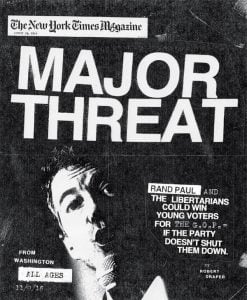 In August 2014, the New York Times Magazine asked a question worthy of a thousand hot takes: “Has the ‘Libertarian Moment’ Finally Arrived?” The story, accompanied by a cover inspired by a Fugazi flier, pointed to the rise of US Senator Rand Paul of Kentucky and followed Reason.com and Reason TV honcho Nick Gillespie between the publication’s offices on Connecticut Avenue and a festival he attended in Lancaster, New Hampshire.
In August 2014, the New York Times Magazine asked a question worthy of a thousand hot takes: “Has the ‘Libertarian Moment’ Finally Arrived?” The story, accompanied by a cover inspired by a Fugazi flier, pointed to the rise of US Senator Rand Paul of Kentucky and followed Reason.com and Reason TV honcho Nick Gillespie between the publication’s offices on Connecticut Avenue and a festival he attended in Lancaster, New Hampshire.
About 500 campers sat attentively, while several others stood off to the side, Hula-Hooping as they listened. Arrayed before Gillespie were several boxes of exotically flavored Pop-Tarts that he had purchased at the Lancaster grocery store. He held them up as evidence that individualism was flourishing and choices were in abundance or, as he put it, “The libertarian moment is now.”
Other outlets were more than happy to exercise their creator-given rights to answer the Times‘s question. “The ‘Libertarian Moment’ Has Definitely Not Arrived,” David Harsanyi wrote in the Federalist. David Frum at the Atlantic served up “Why the ‘Libertarian Moment’ Isn’t Really Happening,” and Daniel Greenfield explained “Why the Libertarian Moment Isn’t Here.” Damon Linker wrote up a rare defense of the LibMo: “Yes, the libertarian moment has arrived,” in the Week.
Yes, the Moment got thoroughly outpolled in early contests, not unlike…Rand Paul, who dropped out of the race for the Republican presidential nomination Wednesday, an event Ian Millhiser at ThinkProgress quickly commemorated with a piece called “Rand Paul and the Libertarian Moment That Never Was” and Ramesh Ponnuru marked with “There Never Was a ‘Libertarian Moment.’”
Last October, a story in Politico used Paul’s star-crossed campaign to document “The False Rise and Fall of Rand Paul” (subhead: “He was supposed to embody a new libertarian moment. But there never was one.”) “Have the media ever been more wrong?” author Michael Lind asked.
But by the time Paul exited, Gillespie had tried several times to take a scalpel to the news media’s grasp of the Moment. It’s a wave, he argued in May of last year, not a splash one politician could make: The Moment represents “comfort with and demand for increasingly individualized and personalized options and experiences in every aspect of our lives.” In December, he wrote that “politics is a lagging indicator of where America is headed. It will be the last area of our lives to be transformed.” (Yet on Wednesday, he still fêted Paul’s campaign for injecting libertarian thinking on criminal justice reform and surveillance into the race.)
Reached by phone, Gillespie again mentioned Pop-Tarts as an example of the vast amount of choices people have today—”I should be getting a royalty from Kellogg’s,” he says about his fondness for the toaster-pastry metaphor—but says the Libertarian Moment is “absolutely independent of what idiot is running for president or dogcatcher.” Poll after poll, he says, shows younger people identifying with libertarian tenets like smaller government, unhappiness with government interference into their personal or sex lives, and unfettered business growth.
“If you enjoy the choice coming through your screen via Netflix,” he says, you’re chilling to libertarian principles.
Reason’s audience has grown, Gillespie says. Its magazine doesn’t report circulation to the Alliance for Audited Media; but he says it’s about 45,000 for the print and digital editions of the magazine, down from a high around 60,000 at the beginning of the 21st century. Digitally, though, he says the audience is up a lot, with about 4 million visits per month. That sounds like a count of pageviews, not individual readers–data from comScore show Reason.com had an average of 655,000 unique visitors per month in 2015, with more than a million unique readers in April and June.
The future of the libertarian movement, it seems, will depend on how well it convinces voters, particularly young ones, that they’re already libertarians but don’t know it. Paul veered away from classic libertarianism in the race, especially with regard to gay marriage and immigration. (Gillespie and Reason have described him as “libertarian-ish.”) “If the Republican Party wants to benefit from its small-government rhetoric,” he says, “it has to become libertarian not just in its language but in its action.” Besides Netflix and Pop-Tarts, Gillespie sees libertarianism’s biggest impact in policies like school choice and forcing government units to compete with private entities to, say, run toll roads. The sum of all that libertarian thought, he says, is a “system that delivers a Whole Foods rather than a ‘Socialist Safeway‘ in Adams Morgan.”
A libertarian president may be a longer-term goal than decent produce. Until the Republican Party meets libertarian-minded, if not libertarian-identifying, voters on issues like immigration and spending, he says, it won’t see the inside of the Oval Office anytime soon. “The Republican Party is not yet succeeding at the national level, in terms of presidential elections, because they don’t get libertarianism yet,” Gillespie says.



















